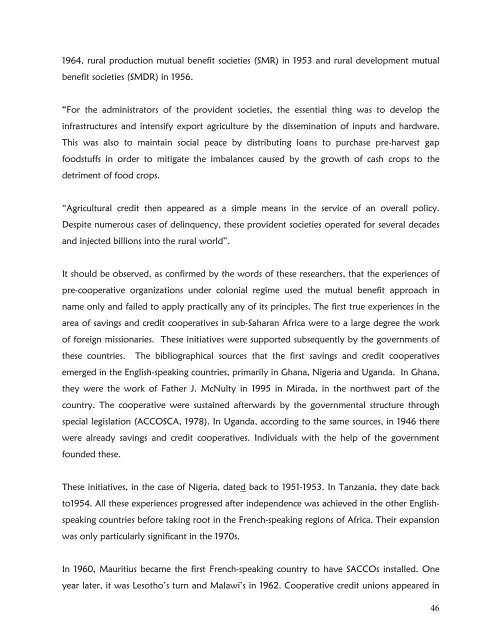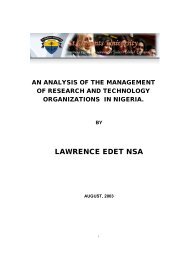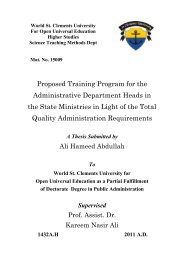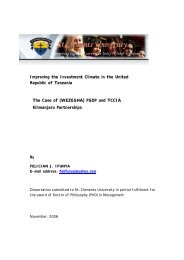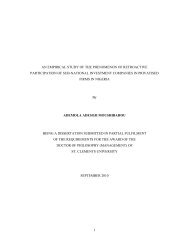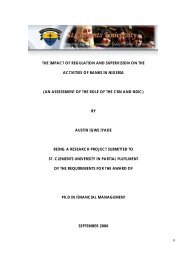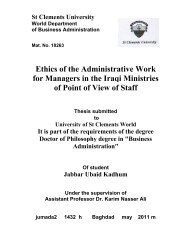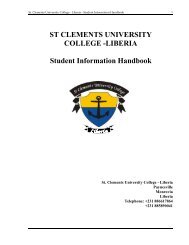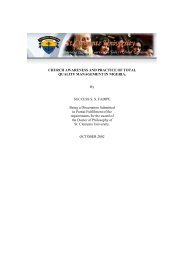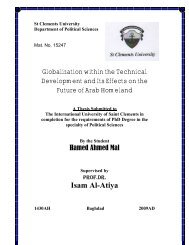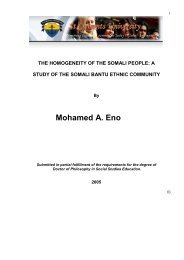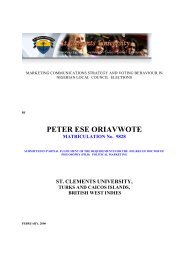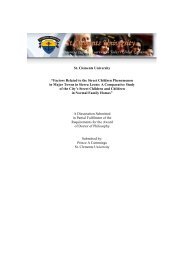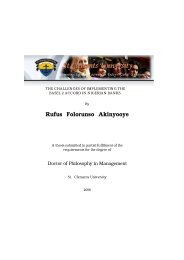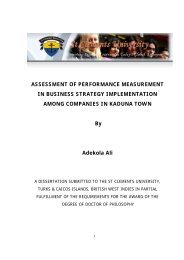The role of informal microfinance institutions in saving
The role of informal microfinance institutions in saving
The role of informal microfinance institutions in saving
You also want an ePaper? Increase the reach of your titles
YUMPU automatically turns print PDFs into web optimized ePapers that Google loves.
1964, rural production mutual benefit societies (SMR) <strong>in</strong> 1953 and rural development mutual<br />
benefit societies (SMDR) <strong>in</strong> 1956.<br />
“For the adm<strong>in</strong>istrators <strong>of</strong> the provident societies, the essential th<strong>in</strong>g was to develop the<br />
<strong>in</strong>frastructures and <strong>in</strong>tensify export agriculture by the dissem<strong>in</strong>ation <strong>of</strong> <strong>in</strong>puts and hardware.<br />
This was also to ma<strong>in</strong>ta<strong>in</strong> social peace by distribut<strong>in</strong>g loans to purchase pre-harvest gap<br />
foodstuffs <strong>in</strong> order to mitigate the imbalances caused by the growth <strong>of</strong> cash crops to the<br />
detriment <strong>of</strong> food crops.<br />
“Agricultural credit then appeared as a simple means <strong>in</strong> the service <strong>of</strong> an overall policy.<br />
Despite numerous cases <strong>of</strong> del<strong>in</strong>quency, these provident societies operated for several decades<br />
and <strong>in</strong>jected billions <strong>in</strong>to the rural world”.<br />
It should be observed, as confirmed by the words <strong>of</strong> these researchers, that the experiences <strong>of</strong><br />
pre-cooperative organizations under colonial regime used the mutual benefit approach <strong>in</strong><br />
name only and failed to apply practically any <strong>of</strong> its pr<strong>in</strong>ciples. <strong>The</strong> first true experiences <strong>in</strong> the<br />
area <strong>of</strong> sav<strong>in</strong>gs and credit cooperatives <strong>in</strong> sub-Saharan Africa were to a large degree the work<br />
<strong>of</strong> foreign missionaries. <strong>The</strong>se <strong>in</strong>itiatives were supported subsequently by the governments <strong>of</strong><br />
these countries. <strong>The</strong> bibliographical sources that the first sav<strong>in</strong>gs and credit cooperatives<br />
emerged <strong>in</strong> the English-speak<strong>in</strong>g countries, primarily <strong>in</strong> Ghana, Nigeria and Uganda. In Ghana,<br />
they were the work <strong>of</strong> Father J. McNulty <strong>in</strong> 1995 <strong>in</strong> Mirada, <strong>in</strong> the northwest part <strong>of</strong> the<br />
country. <strong>The</strong> cooperative were susta<strong>in</strong>ed afterwards by the governmental structure through<br />
special legislation (ACCOSCA, 1978). In Uganda, accord<strong>in</strong>g to the same sources, <strong>in</strong> 1946 there<br />
were already sav<strong>in</strong>gs and credit cooperatives. Individuals with the help <strong>of</strong> the government<br />
founded these.<br />
<strong>The</strong>se <strong>in</strong>itiatives, <strong>in</strong> the case <strong>of</strong> Nigeria, dated back to 1951-1953. In Tanzania, they date back<br />
to1954. All these experiences progressed after <strong>in</strong>dependence was achieved <strong>in</strong> the other English-<br />
speak<strong>in</strong>g countries before tak<strong>in</strong>g root <strong>in</strong> the French-speak<strong>in</strong>g regions <strong>of</strong> Africa. <strong>The</strong>ir expansion<br />
was only particularly significant <strong>in</strong> the 1970s.<br />
In 1960, Mauritius became the first French-speak<strong>in</strong>g country to have SACCOs <strong>in</strong>stalled. One<br />
year later, it was Lesotho’s turn and Malawi’s <strong>in</strong> 1962. Cooperative credit unions appeared <strong>in</strong><br />
46


